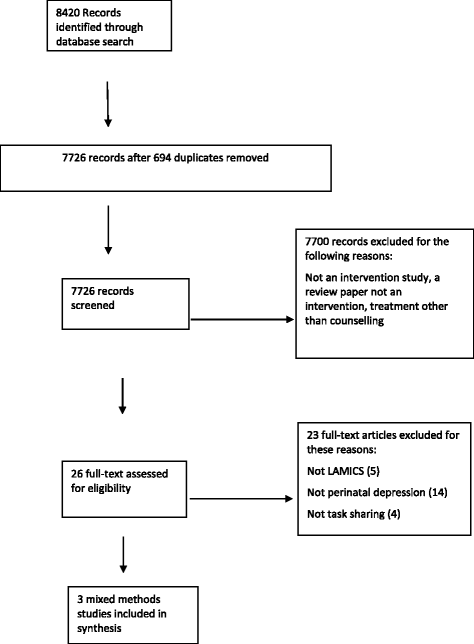Process evaluations of task sharing interventions for perinatal depression in low and middle income countries (LMIC): a systematic review and qualitative meta-synthesis
- PMID: 29566680
- PMCID: PMC5865346
- DOI: 10.1186/s12913-018-3030-0
Process evaluations of task sharing interventions for perinatal depression in low and middle income countries (LMIC): a systematic review and qualitative meta-synthesis
Abstract
Background: Perinatal depression is common in low and middle income countries (LAMICs). Task sharing interventions have been implemented to treat perinatal depression in these settings, as a way of dealing with staff shortages. Task sharing allows lay health workers to provide services for less complex cases while being trained and supervised by specialists. Randomized controlled trials suggest that these interventions can be effective but there is limited qualitative information exploring barriers and facilitators to their implementation. This systematic review aims to systematically review current qualitative evidence of process evaluations of task sharing interventions for perinatal depression in LAMICs in relation to the United Kingdom (UK) Medical Research Council (MRC) framework for conducting process evaluations.
Methods: We searched Medline/ PubMed, PsycINFO, Scopus, Cochrane Library and Web of science for studies from LAMICS using search terms under the broad categories of: (a) "maternal depression'" (b) "intervention" (c) "lay counsellor" OR "community health worker" OR "non-specialist" and (d) "LAMICs". Abstracts were independently reviewed for inclusion by two authors. Full text articles were screened and data for included articles were extracted using a standard data extraction sheet. Qualitative synthesis of qualitative evidence was conducted.
Results: 8420 articles were identified from initial searches. Of these, 26 full text articles were screened for eligibility with only three studies meeting the inclusion criteria. Main findings revealed that participants identified the following crucial factors: contextual factors included physical location, accessibility and cultural norms. Implementation factors included acceptability of the intervention and characteristics of the personnel. Mechanisms included counsellor factors such as motivating and facilitating trust; intervention factors such as use of stories and visual aids, and understandability of the content; and participant factors such as shared experience, meeting learning needs, and meeting expectations.
Conclusions: While task sharing has been suggested as an effective way of filling the treatment gap for perinatal depression, there is a paucity of qualitative research exploring barriers and facilitators to implementing these interventions. Qualitative process evaluations are crucial for the development of culturally relevant interventions.
Keywords: Lay health worker; Low and middle income country; MRC process evaluation guidelines; Perinatal depression; Task shared intervention.
Conflict of interest statement
Ethics approval and consent to participate
Ethics approval for the study was granted through the University of Cape Town Health Sciences Human Research Ethics Committee (HREC Reference no: 226/2011 and 842/2014).
The full protocol is registered on the PROSPERO database URL (
Consent for publication
Not applicable.
Competing interests
The authors declare that they have no competing interests.
Publisher’s Note
Springer Nature remains neutral with regard to jurisdictional claims in published maps and institutional affiliations.
References
-
- Fisher J, Cabral de Mello M, Patel V, Rahman A, Tran T, Holton S, Holmes W. Prevalence and determinants of common perinatal mental disorders in women in low- and lower-middle-income countries: a systematic review. Bull World Health Organ. 2012;90(2):139G–149G. doi: 10.2471/BLT.11.091850. - DOI - PMC - PubMed
Publication types
MeSH terms
Grants and funding
LinkOut - more resources
Full Text Sources
Other Literature Sources
Medical
Miscellaneous


